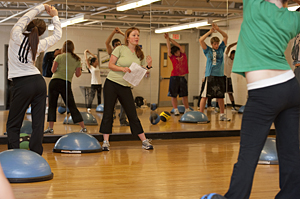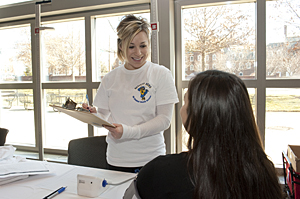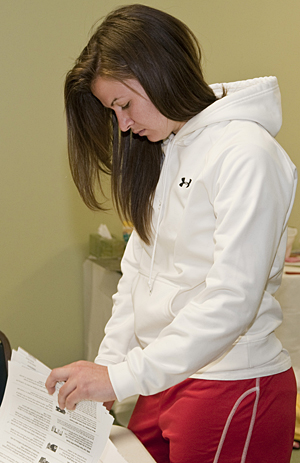


ADVERTISEMENT
- Rozovsky wins prestigious NSF Early Career Award
- UD students meet alumni, experience 'closing bell' at NYSE
- Newark Police seek assistance in identifying suspects in robbery
- Rivlin says bipartisan budget action, stronger budget rules key to reversing debt
- Stink bugs shouldn't pose problem until late summer
- Gao to honor Placido Domingo in Washington performance
- Adopt-A-Highway project keeps Lewes road clean
- WVUD's Radiothon fundraiser runs April 1-10
- W.D. Snodgrass Symposium to honor Pulitzer winner
- New guide helps cancer patients manage symptoms
- UD in the News, March 25, 2011
- For the Record, March 25, 2011
- Public opinion expert discusses world views of U.S. in Global Agenda series
- Congressional delegation, dean laud Center for Community Research and Service program
- Center for Political Communication sets symposium on politics, entertainment
- Students work to raise funds, awareness of domestic violence
- Equestrian team wins regional championship in Western riding
- Markell, Harker stress importance of agriculture to Delaware's economy
- Carol A. Ammon MBA Case Competition winners announced
- Prof presents blood-clotting studies at Gordon Research Conference
- Sexual Assault Awareness Month events, programs announced
- Stay connected with Sea Grant, CEOE e-newsletter
- A message to UD regarding the tragedy in Japan
- More News >>
- March 31-May 14: REP stages Neil Simon's 'The Good Doctor'
- April 2: Newark plans annual 'wine and dine'
- April 5: Expert perspective on U.S. health care
- April 5: Comedian Ace Guillen to visit Scrounge
- April 6, May 4: School of Nursing sponsors research lecture series
- April 6-May 4: Confucius Institute presents Chinese Film Series on Wednesdays
- April 6: IPCC's Pachauri to discuss sustainable development in DENIN Dialogue Series
- April 7: 'WVUDstock' radiothon concert announced
- April 8: English Language Institute presents 'Arts in Translation'
- April 9: Green and Healthy Living Expo planned at The Bob
- April 9: Center for Political Communication to host Onion editor
- April 10: Alumni Easter Egg-stravaganza planned
- April 11: CDS session to focus on visual assistive technologies
- April 12: T.J. Stiles to speak at UDLA annual dinner
- April 15, 16: Annual UD push lawnmower tune-up scheduled
- April 15, 16: Master Players series presents iMusic 4, China Magpie
- April 15, 16: Delaware Symphony, UD chorus to perform Mahler work
- April 18: Former NFL Coach Bill Cowher featured in UD Speaks
- April 21-24: Sesame Street Live brings Elmo and friends to The Bob
- April 30: Save the date for Ag Day 2011 at UD
- April 30: Symposium to consider 'Frontiers at the Chemistry-Biology Interface'
- April 30-May 1: Relay for Life set at Delaware Field House
- May 4: Delaware Membrane Protein Symposium announced
- May 5: Northwestern University's Leon Keer to deliver Kerr lecture
- May 7: Women's volleyball team to host second annual Spring Fling
- Through May 3: SPPA announces speakers for 10th annual lecture series
- Through May 4: Global Agenda sees U.S. through others' eyes; World Bank president to speak
- Through May 4: 'Research on Race, Ethnicity, Culture' topic of series
- Through May 9: Black American Studies announces lecture series
- Through May 11: 'Challenges in Jewish Culture' lecture series announced
- Through May 11: Area Studies research featured in speaker series
- Through June 5: 'Andy Warhol: Behind the Camera' on view in Old College Gallery
- Through July 15: 'Bodyscapes' on view at Mechanical Hall Gallery
- More What's Happening >>
- UD calendar >>
- Middle States evaluation team on campus April 5
- Phipps named HR Liaison of the Quarter
- Senior wins iPad for participating in assessment study
- April 19: Procurement Services schedules information sessions
- UD Bookstore announces spring break hours
- HealthyU Wellness Program encourages employees to 'Step into Spring'
- April 8-29: Faculty roundtable series considers student engagement
- GRE is changing; learn more at April 15 info session
- April 30: UD Evening with Blue Rocks set for employees
- Morris Library to be open 24/7 during final exams
- More Campus FYI >>
11:16 a.m., March 21, 2011----A headline in the March 2011 issue of The Nation's Health, published by the American Public Health Association (APHA), reads “Public Health Council Shifts National Focus to Prevention.”
“This means health behavior science and health promotion will become key,” says Michael Peterson, chair of the University of Delaware's Department of Behavioral Health and Nutrition (BHAN).
And it's good news for students selecting the health behavior science (HBS) undergraduate major at UD. The curriculum enables students to explore and analyze how human behavior and environment affect health, chronic disease and quality of life across the lifespan.
“This program is fitness on steroids,” Peterson says. “It's based on the understanding that relying only on the principles of exercise or nutrition isn't enough -- we have to understand why people do what they do and how to work with them to make changes that will improve their quality of life.”
Georges Benjamin, APHA executive director, has referred to the new National Prevention Strategy as “the blueprint for converting our approach to health from one which is sick care to one that is well care.”
That approach opens the door for people trained in HBS to become essential members of the health care team of the future.
The HBS degree prepares students to work in a variety of organizations and settings -- from educational institutions, non-profits, and government agencies to corporations, clinics and hospitals. Careers include wellness program coordination, health education, health coaching, policy analysis, fundraising and event coordination, and nutrition.
Students take a broad range of courses including personal health management, anatomy and physiology, behavior change strategies, physical activity and behavior, health behavior theory and assessment, nutritional concepts, and nutrition and activity. They also learn to develop health promotion programs, and they finish their four years with an internship during the final semester.
HBS majors are also required to complete a minor, which is chosen based on their career interests. Available minors include public health, business administration, coaching science, disability studies, entrepreneurial studies, leisure service management, nutrition, psychology, strength and conditioning, exercise science and leadership.
Peterson emphasizes that while the degree prepares students to immediately enter the work force, it also provides a strong foundation for further education, including medical school as well as physical therapy, occupational therapy and physician assistant programs.
In addition, UD offers a health promotion master's degree that some HBS students choose to enroll in after graduation. First-year master's student Kerrigan Smith followed that path.
“When I came to UD as an undergraduate,” says Smith, “I was really interested in many aspects of health, including nutrition, physical activity, and motivation to comply. While exercise science or nutrition would have allowed me to pursue something I loved, health behavior science encompassed both of them and added the motivation aspect, something I was very passionate about, as well.”
“With diseases that could be prevented much of the time through lifestyle modifications, America could use a lot of health behavior scientists,” she continues. “So much research is emerging that could help improve the quality of life of those in the U.S. and around the world. I wanted to continue to work with the faculty and students here in order to spread the healthy lifestyle revolution. My ultimate goal is to work with a community, non-profit or wellness organization, possibly in a Latin American country, for a couple of years and then return to America to continue this type of work.”
For more information about the HBS major, visit the website or contact Peterson at [pmpeter@udel.edu], Sue Coffing at [scoffing@udel.edu] or Beth Orsega-Smith at [eosmith@udel.edu].
Article by Diane Kukich
Photos by Kathy F. Atkinson and Doug Baker


